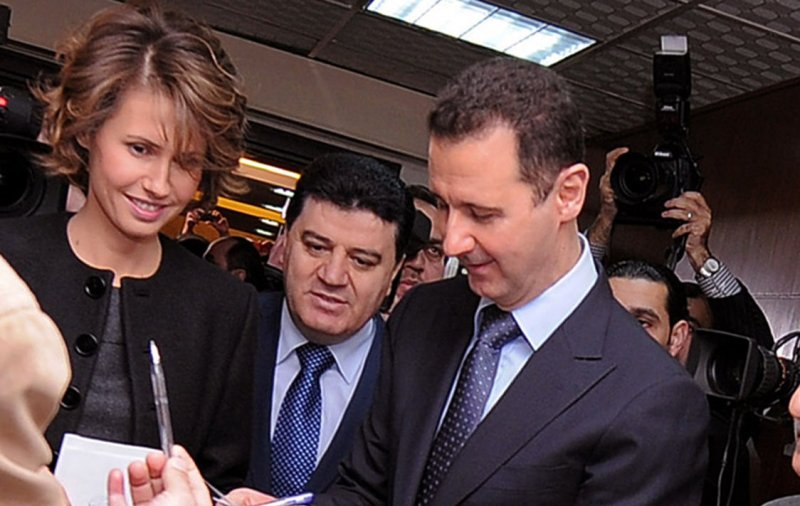1 of 5 | A handout picture released by the Syrian Arab News Agency (SANA) shows Syrian president Bashar al-Assad accompanied by his wife Asma (L), posing for a photograph while casting his vote, during the referendum on a new constitution, at a polling station, in Damascus, Syria, on February 26, 2012. Syrians began voting February 26 on a new constitution that the government says will introduce political pluralism. More than 14,000 polling stations opened nationwide for about 15 million eligible voters. The opposition announced a boycott of the referendum. UPI. |
License Photo
DAMASCUS, Syria, Feb. 27 (UPI) -- Deadly fighting went on in Syria Monday despite the government's announcement that Syrians approved a new constitution by a nearly 90 percent margin.
The BBC reported the Syrian military went on the offensive in the northwestern province of Idlib, firing artillery, mortars and anti-aircraft guns at Binnish and other towns. There were unconfirmed accounts from activists that dozens of people had been killed across Syria, many of them in Homs, the British network said.
In the ongoing effort to pressure the Syrian government of President Bashar Assad to relent, the European Union imposed further sanctions that include a freeze on European-held assets of the Syrian central bank, a travel ban on seven of Assad's close associates, an end to cargo flights from Syria into the EU, and restrictions on the trade in gold and other precious metals.
With deaths mounting, Western leaders questioned the credibility of the constitutional referendum even before results were announced, The New York Times reported.
"The referendum vote has fooled nobody," British Foreign Secretary William Hague said in Brussels Monday. "To open polling stations but continue to open fire on the civilians of the country has no credibility in the eyes of the world."
Voting results appeared across the bottom of the screen on state television in Syria. The government said 89.4 percent, or nearly 7.5 million of 8.4 million who cast ballots, approved the constitution. The Interior Ministry said turnout was 57 percent of more than 14 million eligible voters.
Interior Minister Mohammed Shaar said voting at more than 14,000 polling stations for multiparty elections and presidential term limits began at 7 a.m. local time and ran "normally" in most provinces, with turnout "huge ... except in some areas."
Assad and his British-born wife Asma smiled and waved to cheering public employees as they voted at a polling station in the state-run broadcast center in Damascus, the capital, government TV images showed.
A 36-year-old woman who said she was from the same Alawite clan as Assad told the Times her vote meant a "new Syria."
"This new constitution will shift Syria into the ranks of the democratic countries," she said.
The Times reported no voters appeared in the southern Damascus district of Ma'adamiah until about 1 p.m., and most of them were municipal workers.
Other polling places appeared deserted, the Times said.
Videos posted online by opposition groups purported to show people demonstrating against the vote throughout the country. One showed a poster saying, "We step on the new constitution."
"The Assad regime is arresting hundreds of our sons and brothers, has killed and injured hundreds, so we don't care about this constitution," said Ziad, 25, of Ma'adamiah, who gave only his first name out of fear of retribution. "Syrians will write their real constitution after we finish this regime."
The constitution, made public a couple of weeks ago despite Assad's promises of constitutional reforms since at least June 2011, ends the ruling Baath Party's political monopoly and introduces presidential term limits.
The limits -- two terms of seven years each -- would start only after Assad's current term expires in 2014, the draft constitution says.
This means he could serve two more terms and therefore rule for 28 years, until 2028, when he would be 62. He has been in power since his father, Hafez Assad, died in 2000 at age 69 after ruling for 30 years.
The constitution's multiparty clause requires candidates to have lived in Syria for 10 consecutive years and not have a foreign-born wife, and prohibits parties based on religion or ethnicity -- provision critics say would bar groups such as the Muslim Brotherhood or representatives of the Kurdish minority from participating.
Syrian lawmaker George Jabbour told CNN "special committees will be formed to look into the licensing of new parties in line with the new Constitution" and future presidential elections "will be competitive since there is no leading party anymore."
U.S. Secretary of State Hillary Clinton dismissed the vote as a vacant gesture.
"It's a phony referendum that is going to be used by Assad to justify what he is doing to other Syrians," she told CBS News from Rabat, Morocco. "So it's a cynical ploy to say the least."
German Foreign Minister Guido Westerwelle called the vote "a farce," adding, "Sham votes cannot be a contribution to a resolution of the crisis."
Russia and China endorsed the referendum process.
They also accused Clinton and other "friends of the Syrian people" delegates who met in Tunis, Tunisia, Friday of encouraging war after they called for Assad's ouster and asked the United Nations to begin planning for a peacekeeping force.















